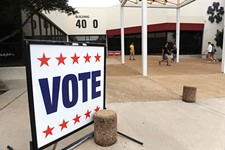Beside the Point
Dueling Dictionaries
By Wells Dunbar, Fri., March 10, 2006
Assistant City Attorney Jenny Gilchrist began last week's discussion of charter amendments by advising City Council that the courts afford the council "quite a bit of discretion" in drafting the amendment language that ultimately appears on the ballot – as long as it gives a "reasonably intelligent voter" sufficient information. Despite that warning, council began anyway, starting with the amendment that would allow city employees' domestic partners – or family members – to buy health insurance at the rate now reserved for legal spouses.
Peddling the blandest terms possible, sponsor Brewster McCracken noted the "responsibility to be a good employer," while Lee Leffingwell characterized the measure as a "straight-out repeal" of the ban against such coverage that passed in 1994, a year after a similar proposal was passed. "We are not spelling out a particular package in this ordinance," he said, "we are just removing the language that prevents us from formulating a … package." (Sponsors McCracken, Leffingwell, and Betty Dunkerley say it will cost the city $200,000 yearly to cover employees, and $50,000 for retirees – although it's worth noting that the back-door costs for lack of health insurance is likely considerably more.)
Those vagaries were all the opening a sourpussed Danny Thomas needed to begin fretting, hemming, and hawing, questioning the amendment's cost, which is indeed nebulous until Toby Futrell prepares her annual budget proposal this summer. "I'm really wanting to know what prompted three sponsors to bring this back [from a decade ago]," said the Reverend, dusting off that old-time religion. "I know that Austin has changed … [but] I don't see the purpose of it," Thomas said, before brandishing the big guns: "There's certain things that I cannot support. I think everyone on this council knows how I feel about … same-sex marriage," he said. "I can't come back and then support something that is a contradiction with what Proposition 2 [the constitutional amendment that banned same-sex marriage] stands for." The mayor pro tem might want to revisit that sentence in a couple of months – specifically the first four words.
Proposition Y: Shall Brewster McCracken and Save Our Springs Director Bill Bunch settle their differences in a no-holds-barred cage-battle royale?
Then there's SOS's "Clean Water" amendment. The already-controversial amendment would tighten the city's response to grandfathered development claims and legally restrict growth over the Edwards Aquifer – and the council discussion went as well as one might imagine. "You might as well have just written, 'Vote no on this measure please,'" said Bunch, after eyeing the city's proposed ballot language. He argued that nothing in the petition-submitted amendment limits "infrastructure improvement," "disqualif[ies] certain individuals from exercising their property rights," or proposes "special districts" around and above the aquifer – all of which are in the city-proposed language. That language, said Bunch, is a perfect demonstration of the "overwhelming evidence why citizens felt they needed to resort to the initiative process."
The wording is a "first attempt," drafted by the city attorney's office, and council is responsible for the final language – but on the dais McCracken insisted the draft accurately reflects the "potentially disastrous consequences" of the SOS amendment: that it would adversely affect water quality, prevent solar power rebates (i.e., "incentives"), and even block affordable housing in Southwest Austin. The language "turns voters off, I agree," said McCracken, but for him, that was just how the amendment crumbled. Bunch didn't agree, saying the city's language doesn't reflect the amendment's intentions in "any way, shape, or form." As Bunch sees it, McCracken is grand marshal of "the parade of lies that will be trotted out before the proposition," and Bunch emphasized that the language specifically rejects subsidies to developers over the aquifer – not the programs McCracken enumerated. "They've shown that they're going to electioneer on the ballot … there's no sense of fair play here."
Asked later if he is taking too broad and negative a reading of the proposition, McCracken told me that while some of SOS's proposals belong in the charter, the city risks exposure to challenges and lawsuits in "uncertain ways." "It's a very risky venue if you build in something with a lot of problems."
On Tuesday, Bunch told me he had "no idea" what surprises lie in store today, when the council's revised language is unveiled, but he's "not exactly hopeful."
Proposition Z: Can we pick this up after lunch, please?
If the aquifer amendment uncorked a downpour of controversy, then SOS's "Clean Government" amendment – to be considered today following the certification of the petition signatures – looks like a ton of dynamite at the base of Tom Miller Dam. Council watchers should look for McCracken to lead the charge against the amendment – which mandates all written and verbal communications between upper-echelon city officials be posted to the Internet in real time – and to harm his case by overstating it. While he may be right to question the amendment's Orwellian aspects, his doomsday version of the proposal conjures child pornographers slithering one step ahead of the law – for, in his estimation, police investigating cybercrime fall under the officials required to disclose all their contacts. That probably ain't the case, but it shows how much fun the amendment will engender.
Other amendments scheduled for discussion would double municipal court judges' terms and allow council members an additional term before being running into term limits, while revisiting campaign finances.
Lastly, returning to the agenda for public hearing are the task force changes to the interim McMansion ordinance, which despite Planning Commission objections, will likely still include duplexes.
Got something to say on the subject? Send a letter to the editor.








